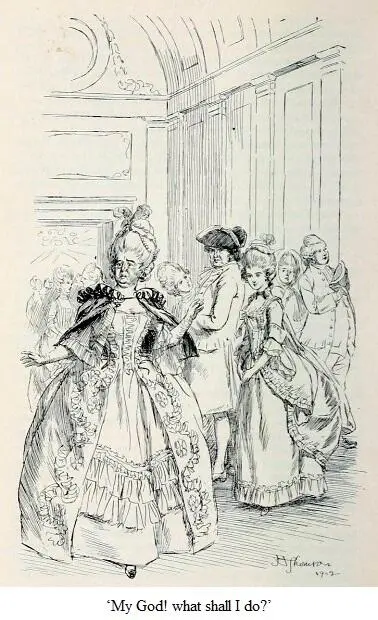Overpowered by all that had passed, I had not strength to make my mortifying explanation; — my spirits quite failed me, and I burst into tears.
They all seemed shocked and amazed.
“What is the matter, my dearest love?” cried Mrs. Mirvan, with kindest concern.
“What have I done!” exclaimed my evil genius, and ran officiously for a glass of water.
However, a hint was sufficient for Lord Orville, who comprehended all I would have explained. He immediately led me to a seat, and said in a low voice, “Be not distressed, I beseech you: I shall ever think my name honoured by your making use of it.”
This politeness relieved me. A general murmur had alarmed Miss Mirvan, who flew instantly to me; while Lord Orville the moment Mrs. Mirvan had taken the water, led my tormentor away.
“For Heaven’s sake, dear Madam,” cried I, “let me go home; — indeed I cannot stay here any longer.”
“Let us all go,” cried my kind Maria.
“But the Captain, what will he say — I had better go home in a chair.”
Mrs. Mirvan consented, and I rose to depart. Lord Orville and that man both came to me. The first, with an attention I but ill-merited from him, led me to a chair; while the other followed, pestering me with apologies. I wished to have made mine to Lord Orville, but was too much ashamed.
It was about one o’clock. Mrs. Mirvan’s servants saw me home.
And now — what again shall ever tempt me to an assembly? I dread to hear what you will think of me, my most dear and honoured Sir: you will need your utmost partiality to receive me without displeasure.
This morning Lord Orville has sent to inquire after our health; and Sir Clement Willoughby, for that, I find, is the name of my persecutor, has called; but I would not go down stairs till he was gone.
And now, my dear Sir, I can somewhat account for the strange, provoking, and ridiculous conduct of this Sir Clement last night; for Miss Mirvan says he is the very man with whom she heard Lord Orville conversing at Mrs. Stanley’s, when I was spoken of in so mortifying a manner. He was pleased to say he was glad to hear I was a fool; and therefore, I suppose, he concluded he might talk as much nonsense as he pleased to me: however, I am very indifferent as to his opinion; — but for Lord Orville — if then he thought me an idiot, now, I am sure, he must suppose me both bold and presuming. Make use of his name! — what impertinence — he can never know how it happened — he can only imagine it was from an excess of vanity; — well, however, I shall leave this bad city tomorrow, and never again will I enter it.
The Captain intends to take us to-night to the Fantoccini. I cannot bear that Captain; I can give you no idea how gross he is. I heartily rejoice that he was not present at the disagreeable conclusion of yesterday’s adventure, for I am sure he would have contributed to my confusion; which might, perhaps, have diverted him, as he seldom or never smiles but at some other person’s expense.
And here I conclude my London letters — and without any regret; for I am too inexperienced and ignorant to conduct myself with propriety in this town, where everything is new to me, and many things are unaccountable and perplexing.
Adieu, my dear Sir; Heaven restore me safely to you! I wish I was to go immediately to Berry Hill; yet the wish is ungrateful to Mrs. Mirvan, and therefore I will repress it. I shall write an account of the Fantoccini from Howard Grove. We have not been to half the public places that are now open, though I dare say you will think we have been to all. But they are almost as innumerable as the persons who fill them.
LETTER 14
EVELINA IN CONTINUATION
Table of Contents
Queen Ann Street, April 13.
How much will you be surprised, my dearest Sir, at receiving another letter, from London, of your Evelina’s writing! But, believe me, it was not my fault, neither is it my happiness, that I am still here: our journey has been postponed by an accident equally unexpected and disagreeable.
We went last night to see the Fantoccini, where we had infinite entertainment from the performance of a little comedy in French and Italian, by puppets, so admirably managed, that they both astonished and diverted us all, except the Captain, who has a fixed and most prejudiced hatred of whatever is not English.

When it was over, while we waited for the coach, a tall elderly woman brushed quickly past us, calling out, “My God, what shall I do?”
“Why, what would you do?” cried the Captain.
“Ma foi, Monsieur,” answered she, “I have lost my company, and in this place I don’t know nobody.”
There was something foreign in her accent, though it was difficult to discover whether she was an English or a French woman. She was very well dressed; and seemed so entirely at a loss what to do, that Mrs. Mirvan proposed to the Captain to assist her.
“Assist her!” cried he, “ay, with all my heart; — let a link-boy call her a coach.”
There was not one to be had, and it rained very fast.
“Mon Dieu!” exclaimed the stranger, “what shall become of me? Je suis au desespoir!”
“Dear Sir,” cried Miss Mirvan, “pray let us take the poor lady into our coach. She is quite alone, and a foreigner —”
“She’s never the better for that,” answered he: “she may be a woman of the town, for anything you know.”
“She does not appear such,” said Mrs. Mirvan; “and indeed she seems so much distressed, that we shall but follow the golden rule, if we carry her to her lodgings.”
“You are mighty fond of new acquaintance,” returned he; “but first let us know if she be going our way.”
Upon inquiry, we found that she lived in Oxford Road; and, after some disputing, the Captain surlily, and, with a very bad grace, consented to admit her into his coach; though he soon convinced us, that he was determined she should not be too much obliged to him, for he seemed absolutely bent upon quarrelling with her: for which strange inhospitality I can assign no other reason, than that she appeared to be a foreigner.
The conversation began, by her telling us, that she had been in England only two days; that the gentlemen belonging to her were Parisians, and had left her to see for a hackney-coach, as her own carriage was abroad; and that she had waited for them till she was quite frightened, and concluded that they had lost themselves.
“And pray,” said the Captain, “why did you go to a public place without an Englishman?”
“Ma foi, Sir,” answered she, “because none of my acquaintance is in town.”
“Why then,” said he, “I’ll tell you what, your best way is to go out of it yourself.”
“Pardi, Monsieur,” returned she, “and so I shall; for, I promise you, I think the English a parcel of brutes; and I’ll go back to France as fast as I can, for I would not live among none of you.”
“Who wants you?” cried the Captain: “do you suppose, Madam French, we have not enough of other nations to pick our pockets already? I’ll warrant you, there’s no need for you for to put in your oar.”
“Pick your pockets, Sir! I wish nobody wanted to pick your pockets no more than I do; and I’ll promise you you’d be safe enough. But there’s no nation under the sun can beat the English for ill-politeness: for my part, I hate the very sight of them; and so I shall only just visit a person of quality or two of my particular acquaintance, and then I shall go back again to France.”
“Ay, do,” cried he; “and then go to the devil together, for that’s the fittest voyage for the French and the quality.”
Читать дальше













